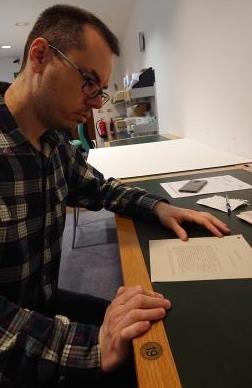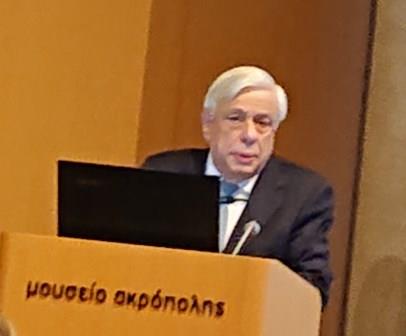Yannis Andritsopoulos, London Correspondent for Ta Nea, Greece's daily newspaper visited the Tate Reading Rooms to see Kenneth Clark's original letter.

Kenneth Clark, a British art historian and Trustee of the British Museum, was in favour of the return of the Parthenon Marbles to Greece in the 1940s, it can be revealed.
Ta Nea, Greece’s daily newspaper, has seen and photographed a letter written by Clark in which he states explicitly that the so-called 'Elgin Marbles' should be sent back to Athens, with the aim of reuniting them with the rest of the Parthenon sculptures in one place.
"I am, quite irrationally, in favour of returning the Elgin marbles to Greece, not to be put back on the Parthenon, but to be installed in a beautiful building on the far side of the Acropolis, which I think the British Government should pay for. I would do this purely on sentimental grounds, as an expression of our indebtedness to Greece," the letter reads.
Clark wrote this letter on 3rd September, 1943. He sent it to Thomas Bodkin, then director of the Barber Institute of Fine Arts and Barber Professor of Fine Art at the University of Birmingham. At the time, Clark was Director of the National Gallery. His letter is currently kept in Tate Britain.
This is the only time that a British Museum Trustee has gone on record as being openly in favour of the Parthenon Sculptures’ reunification, a view standing in stark contrast to the position of the British Museum that the Elgin marbles should stay in London.
 Greek President Prokopis Pavlopoulos
Greek President Prokopis Pavlopoulos
Greek President Prokopis Pavlopoulos told Ta Nea: “The request for the return of the Parthenon Sculptures had found, since 1943, an "unexpected" ally in Lord Kenneth Clark, who is included among the most important 20th-century art historians and who, in this capacity, participated in the administration of the most relevant British Institutions, such as the British Museum, the National Gallery, the National Theatre, the Royal Opera House.”
“This example clearly evinces the gentility and nobility of Kenneth Clark’s character as well as the strength and conviction of his ‘cultural morality’. These elements, in conjunction with the expression of his respect for the World Cultural Heritage and the roots of our Civilisation, make him a great representative of Britain’s tradition. Clark’s case also evinces how "miserable" and completely unworthy of Britain's tradition as outlined above is the attitude of the British Museum's officials today, who thus end up appearing inferior to the circumstances and the necessities pertaining to the defence of World Cultural Heritage and our common Civilisation and, furthermore, unrepentant accomplices of Elgin's cultural crime,” Pavlopoulos added.
 Professor Anthony Snodgrass
Professor Anthony Snodgrass
“Kenneth Clark’s (slightly unexpected) support, for a position now widely held in the U.K., is one pleasant revelation. More important, however, is his perceptive emphasis on the need for separate solutions to individual cases; and, yet more striking, the uncanny accuracy of his prediction, for the Marbles “to be installed in a beautiful building on the far [that is, South] side of the Acropolis”,” said Professor Anthony Snodgrass, Emeritus Professor in Classical Archaeology at the University of Cambridge, Honorary President of the British Committee for the Reunification of the Parthenon Marbles.
“More than sixty-five years later, the greater part of this prophecy was to be precisely fulfilled; it only remains for the natural sequel, the 'reintegration' of the Marbles, to be enacted too," he added.
 Professor Judith Herrin
Professor Judith Herrin
“How splendid that Kenneth Clark's 1943 vision of the reunited Parthenon marbles has been perfectly realised in the New Acropolis Museum,” said Professor Judith Herrin, Constantine Leventis Senior Research Fellow Emeritus at King's College London, and one of the longest serving members of the British Committee for the Reunification of the Parthenon Marbles.
“On 20th June the superlative Acropolis Museumwill celebrate its 10th anniversary, having welcomed over 14 million visitors from all over the world and one can but imagine how elated Kenneth Clark would have been. Not only to see the top floor of the museum, the Parthenon Gallery but also the floors below and the opening of the area that has been painstakingly excavated to reveal 4,000 metres of homes, workshops, baths – an entire Athenian neighbourhood that existed from classical to byzantine years. What a pity that he is not alive to physically see all this and yet he too would have continued to have added his voice to the reunification of the Parthenon marbles. Britain has not paid for this museum and yet what is still missing are the many pieces that Lord Elgin so crudely removed from a building, currently displayed in the British Museum, the wrong way around, miles away from their other halves. Here’s to the day when they can be reunited in Athens and with views to the Parthenon, which still stands,” she added.
The Parthenon Sculptures have been displayed in the British Museum since 1817. They were removed from the Acropolis in Athens in the early 19th century by British diplomat Lord Elgin. Greece has challenged claims by the British Museum that Lord Elgin had obtained permission to transfer the Marbles from Athens to London and has demanded Britain open negotiations over their return.
Kenneth Clark (13 July 1903 – 21 May 1983) was a British art historian, museum director, and broadcaster. He was the National Gallery’s youngest ever Director. He achieved international fame as the writer, producer and presenter of the BBC Television series Civilisation.
Published in Ta Nea, Greece’s daily newspaper (www.tanea.gr) . To read the origial article , follow the link here.
Publication date: 14 June 2019